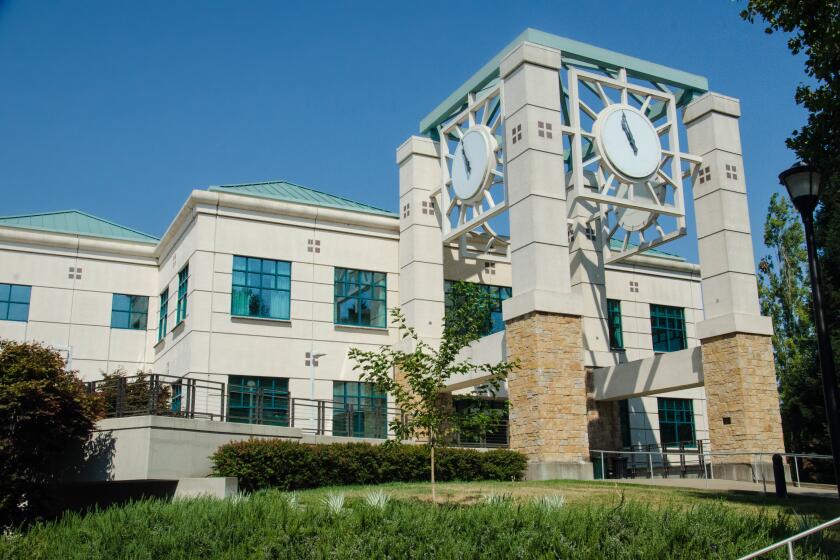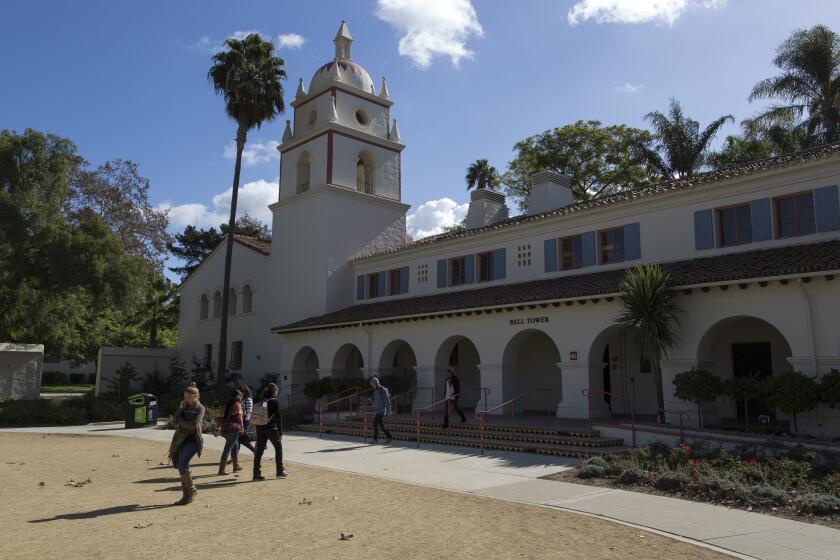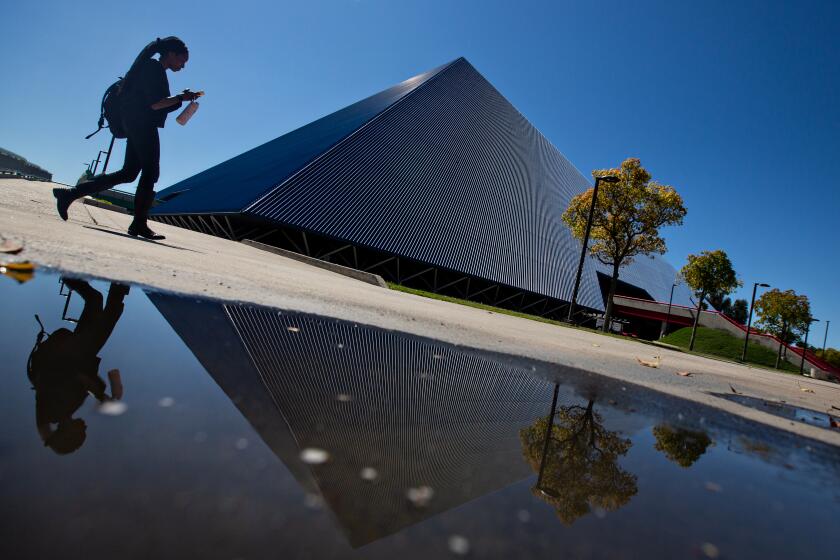On a ship where future mariners train, CSU women say they faced sexual abuse and harassment
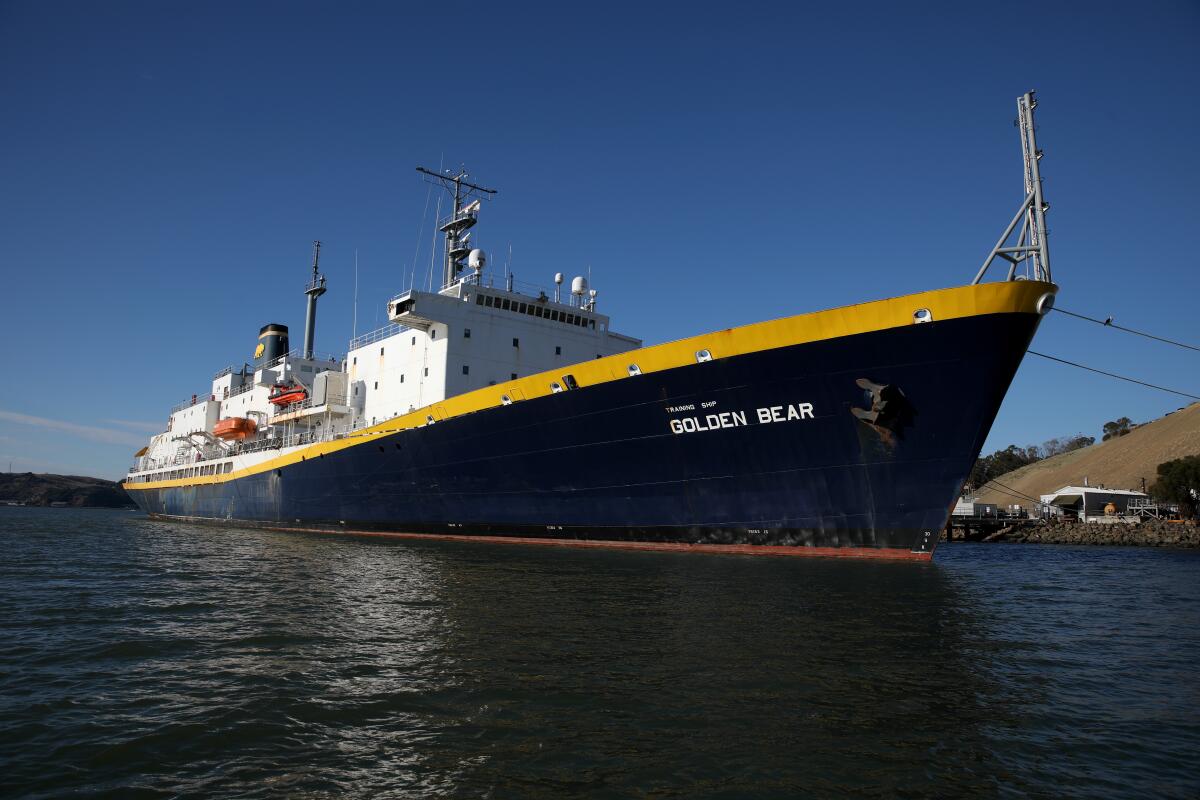
MORROW COVE, Calif. — For nearly three decades, the navy-and-gold Training Ship Golden Bear has plied oceans around the globe for California State University’s Maritime Academy, providing a unique classroom for students training to be leaders in the seafaring industry.
In recent years, Cal Maritime students and employees reported accusations of rape, sexual assault and sexual harassment aboard the 500-foot ship to officials at the Vallejo campus.
Interviews and internal campus records reviewed by The Times showed the allegations included two rapes reported in 2019, a sexual assault in 2022 and accusations that a captain sexually harassed women and made disparaging remarks about the LGBTQ community and women during a 2021 training cruise.
The school did not report those allegations to federal maritime authorities and has not followed consistent procedures for handling wrongdoing on the vessel, a Times investigation has found.
Cal Maritime acknowledged it did not report the allegations to the U.S. Maritime Administration, which owns the vessel. The federal agency said such reports are required under a long-standing agreement allowing the campus to use the training ship.
The agreement requires the campus to “promptly report” alleged violations of state, federal and international laws, statutes or regulations and provide “complete written details of the occurrence.” That includes sexual harassment, sexual assault and retaliation, a spokesman for the Maritime Administration said in statements to The Times.
Campus officials said they believe they complied with the provisions, noting they contain no language that “directly addresses reporting obligations for sexual assault and sexual harassment ... incidents.”
Recent revelations about how California State University handled sexual harassment and workplace retaliation complaints have rocked the nation’s largest four-year public university system.
The maritime agency acknowledged that it has never conducted a compliance review to determine whether sexual misconduct cases at Cal Maritime are being properly handled by the campus.
Following inquiries by The Times, presidents from Cal Maritime and other state maritime academies are moving to strengthen protocols for reporting sexual misconduct on their U.S.-owned training vessels.
The new details come amid heightened scrutiny of alleged misconduct at the school on the San Francisco Bay after a Times report in December exposed decades-long claims of sexual assault and sexual harassment, homophobia, transphobia and racism on campus and during training cruises.
The Maritime Administration said it was concerned about accusations raised in The Times’ report. The agency said its civil rights office will review the school’s handling of sexual misconduct and retaliation complaints and work with the campus to address any problems. The review will also determine whether the campus violated the terms of the agreement.
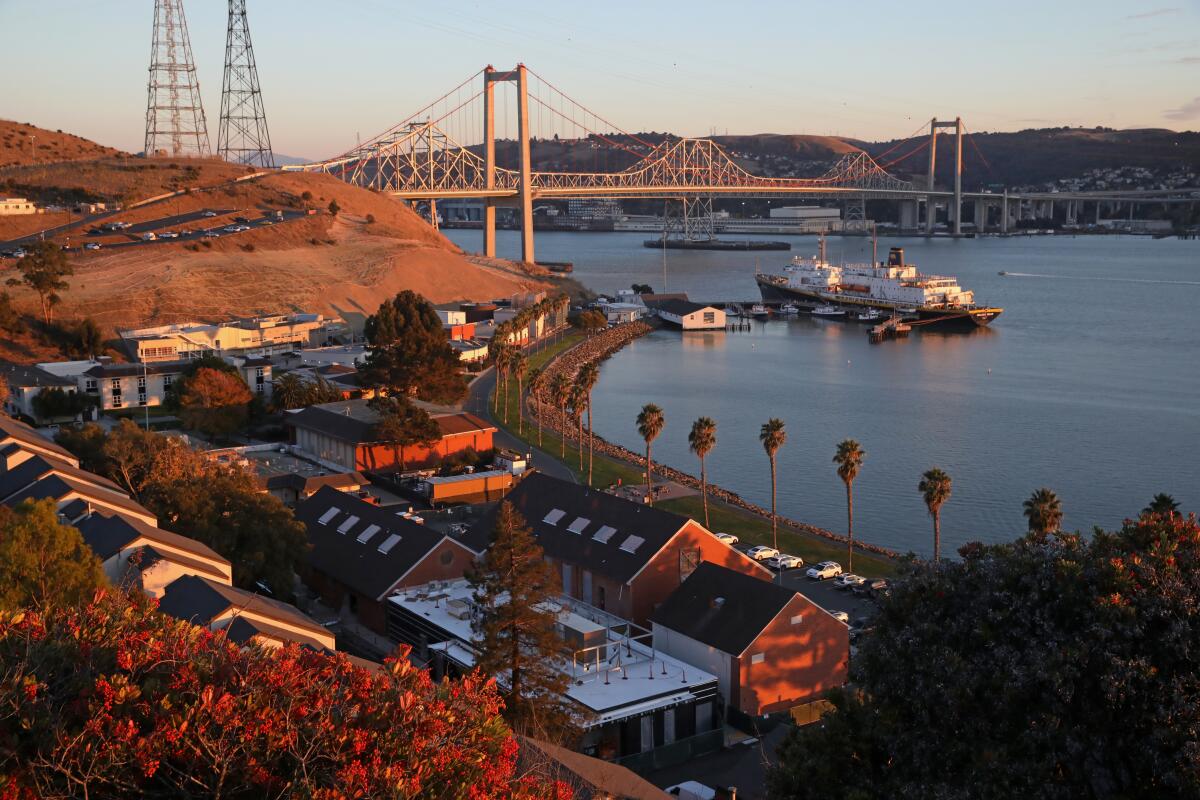
Failure to abide by the agreement, the agency said, could jeopardize funding it provides to the small campus, which has totaled more than $10 million in the last five years, and prompt an investigation by the U.S. Department of Justice.
The senior Democrat on a congressional subcommittee overseeing maritime operations said in a statement that he was “deeply troubled” to learn of “Cal Maritime’s failure to report instances of sexual assault, harassment, and retaliation.”
“Their top priority must be uprooting any culture that turns a blind eye to sexual misconduct,” Rep. Salud Carbajal (D-Santa Barbara) said in response to The Times’ findings.
Women and trans and nonbinary cadets at Cal State University Maritime Academy describe a pervasive culture of misogyny, sexual abuse and harassment.
The campus said President Thomas A. Cropper was unavailable for interviews.
In a statement, Cropper said that the school has been a leader in addressing sexual misconduct in the maritime industry and that he recently was in Washington meeting with federal officials and leaders from other state maritime academies to develop improved reporting protocols for sexual harassment and sexual assault.
The retired rear admiral added that the campus is working with the Maritime Administration on a new agreement that will clarify language about reporting sexual misconduct.
“Cal Maritime believes it has met every reporting obligation under federal law and our agreement with [the Maritime Administration],” said Cropper, who is stepping down in August.
In 2021 and 2022, the campus said it reported two incidents of wrongdoing, while the Maritime Administration said it received three reports. Neither the campus nor the agency could account for the discrepancy.
A review of hundreds of records reveal inconsistencies in addressing sexual harassment allegations at California State University.
Cal Maritime did not provide direct answers to detailed and repeated questions from The Times about the recent misconduct allegations and vaguely described accusations of rape and sexual assault aboard the ship as “sexual activity without affirmative consent.”
The campus said it took “appropriate action in each and every one of these incidents” and launched investigations per the CSU nondiscrimination policy, which prohibits sexual harassment, sexual misconduct, retaliation and other wrongdoing. The school said it reported the incidents to the U.S. Department of Education as required by law.
A Times review of internal campus records, including sexual misconduct investigations, emails and shipboard captain reports, found significant disparities in how officials handled misconduct accusations aboard the Golden Bear:
After a death threat last year against a transgender officer, the captain and another top officer said there was a lack of written protocols for conducting investigations on the ship and began their own inquiry after complaints that the threat had created a hostile environment for LGBTQ crew members.
When vandalism and homophobic graffiti were discovered in 2021, Cropper ordered a senior administrator to rendezvous with the vessel to investigate. During the inquiry, according to internal records, multiple people accused the captain of sexual harassment and making disparaging remarks. The campus did not formally investigate those accusations until a separate complaint was filed months later, the records show.
And after two women reported in 2019 and 2022 that they were raped and otherwise sexually assaulted by male classmates while the Golden Bear was docked on campus, the school hired an outside firm to investigate the allegations.
::
Nestled along a tree-lined cove overlooking the Carquinez Bridge, the campus trains cadets to become U.S. Merchant Marine officers. About 800 students attend the school, one of seven maritime academies in the United States and the only one of its kind on the West Coast.
Federal reporting requirements are important, maritime law experts say, because they can alert officials to systemic problems and provide additional oversight to protect employees and cadets, as students at Cal Maritime are called.
“They should be leading the way in responding to this ... rather than trying to explain why they are not doing that,” said Edward M. Bull III, an Oakland attorney who specializes in maritime law.
Cadets who spoke to The Times said they didn’t know that the university was required to report allegations of sexual misconduct to federal maritime officials, nor did they realize that students could do the same. They said a broader awareness and practice of the policy might help deter predatory behavior.
Concerns about the university’s response to allegations of wrongdoing aboard the training ship date back decades.
During a 1990 hearing in the California Legislature, lawmakers criticized Cal Maritime leadership for failing to protect students after the Maritime Administration investigated claims of sexual misconduct and racial discrimination aboard its training ship at the time.
Union organizers say the pay disparities among nonfaculty members highlight a failing CSU salary system that cannot offer competitive pay.
A state senator said the university would not be allowed to return to “business as usual.” The president at the time announced his retirement shortly after and was replaced by the first woman to head the academy.
Carbajal, who recently told the California State University chancellor in a letter that the pervasive problems at Cal Maritime were “inexcusable,” said that weeding out sexual misconduct is more important than ever as the country struggles to recruit mariners, who are vital to the supply chain.
“A culture that protects our mariners starts with our training pipeline — at institutions like Cal Maritime,” he said.
Cal Maritime is one of 23 campuses within the CSU — the largest four-year public university system in the nation. The state is conducting an audit following Times investigations that found repeated inconsistencies in how campuses across the system handle sexual misconduct and retaliation cases.
::
Before the onset of COVID-19, the Golden Bear was used as a freshman residence hall while docked at the edge of campus in Morrow Cove on the northern San Francisco Bay.
Originally built for the U.S. Navy, the ship was transferred to Cal Maritime in 1996 and has provided a hands-on learning experience for cadets who study the design of the vessel and navigate ocean waters under the direction of a captain and ship officers.
During months-long summer ocean cruises, about 300 cadets and crew members live and work on the vessel, which has nine decks connected by stairwells and narrow passageways.
The ship is outfitted with classrooms, a library and a gym, and students sleep in small rooms with stacked beds and shared bathrooms. There’s a lounge known as Pirate’s Cove and space to stow fishing gear and surfboards. Work assignments include the bridge, where the captain commands the vessel, and the engine room below deck, where massive diesel engines power the Golden Bear on voyages to Asia, Europe and Latin America.
A cadet who lived on the Golden Bear while it was docked on campus said that a male student also residing on board raped her twice in the ship’s close quarters, according to campus investigative records reviewed by The Times.
The assaults took place in a classroom and her bedroom, she alleged in a sexual misconduct complaint filed in 2019. It was one of the claims the campus did not report to federal authorities.
The cadet asserted that she never consented to sex with the male student and that she was intoxicated during both incidents — a claim corroborated by multiple witnesses who spoke to investigators.
In the first incident, the cadet said, she met with the male student in the ship classroom hours after she had been drinking with him. They had planned to watch a movie, she said, when he allegedly raped her.
A month later, the woman alleged, the cadet raped her again after she returned from a party. She said she didn’t have the strength to stop him, campus records show.
At a campus hearing in 2020, the cadet accused of assaulting the woman said he inferred permission for the encounter “from her reaction to his advances,” the records show.
The hearing officer concluded there was no violation of CSU policy.
Afterward, the woman said that a campus official encouraged her to file an appeal. She chose not to go forward.
“I was burnt out and wanted to put it behind me,” she said in an interview with The Times.
She recalled the emotional turmoil she felt. During the investigation, her grades fell and she was placed on academic probation as she recovered from the trauma, she said.
“That took a little bit of psychological healing,” she said. The Times does not typically identify people who allege that they were sexually assaulted.
Another cadet who reported an alleged sexual assault aboard the Golden Bear said it was troubling that the university did not disclose her claim and other such incidents to federal officials.
She and a male classmate were on a late-night security patrol of the ship while it was docked at the academy last spring, according to records from a campus sexual assault investigation launched after she filed a formal complaint last year.
She alleged that he pulled her into a room, grabbed her face and began kissing her, then unzipped her boilersuit and grabbed her all over her body, the records show.
The investigation, which is continuing, is also examining a second allegation by the woman that the classmate raped her in a separate attack in the campus dorms, according to the records. He said that he did nothing wrong and that they engaged in consensual sex.
In interviews, the woman said she kept an eye out for her alleged attacker’s vehicle in school parking lots and stopped going to the dining center to avoid seeing him. After much self-blame, she said, she was prescribed antidepressants, which she no longer takes.
This semester has been better, she said, because her accused attacker is no longer at school. But the cadet said she remains disappointed that campus leaders did not alert federal maritime officials.
“It makes it seem like they want to carry on as if nothing happened,” said the woman, who wants to travel the world as an officer in the U.S. Merchant Marine.
“It’s this kind of ... response that manipulates victims into believing that what happened to them wasn’t a big deal,” she said.
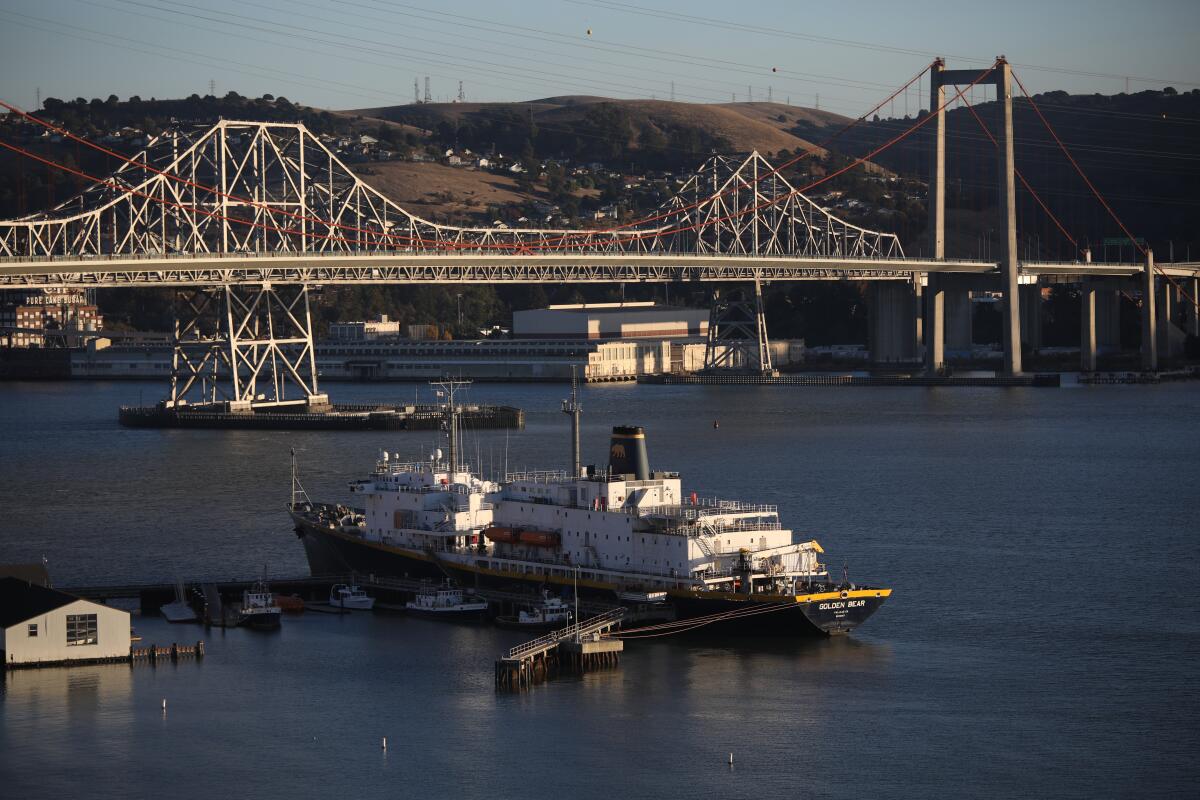
In summer 2021, cadets vandalized the Golden Bear during a training cruise. Phallic symbols were chalked on walls, and a sleeping quarters door was removed from its hinges and replaced with another that had a window in the middle and a homophobic slur etched below.
Chief mate Jessica Ryals, the second in command, alerted the ship captain and the campus to the vandalism. The president dispatched the director of marine transportation, Samuel Pecota, to meet the vessel the next day off Catalina and investigate. The captain notified federal maritime officials about the vandalism, according to the campus.
During Pecota’s inquiry, internal records reviewed by The Times show, multiple people accused Capt. Louis Solana of staring at women’s breasts, singing a lewd karaoke song and being openly dismissive of and derogatory toward women and the LGBTQ community.
The claims were detailed in a confidential report to Cropper on Sept. 1, 2021, several days after the Golden Bear had returned to the school. Solana was put on leave for the semester as officials reviewed the vandalism investigation, the campus said.
The university ordered a review of training cruise culture, focusing on the two voyages that summer. But the campus did not report the sexual harassment claims against Solana to federal maritime officials, nor did it launch a formal investigation into the allegations that Pecota reported.
Pecota declined to be interviewed.
In October 2021, Solana defended himself in an 18-page rebuttal that he shared with a faculty member and cadet. In the document, which was leaked to the campus community, he called the accusations in the report “slanderous” and labeled the relationship between Pecota and Ryals as “collusive.” He also accused Ryals of displaying “poor leadership” and “questionable moral conduct,” adding that she contributed “to a hostile environment aboard the vessel.”
Solana declined to comment for this article, saying that campus management told him the case is confidential.
Ryals told The Times that the campus community turned on her in defense of Solana. She was targeted in anonymous social media posts and heard whispers directed at her that included “c—,” “bitch,” “just quit already” and “kill yourself.” Someone broke into her car on campus, she said, and she no longer felt safe walking the grounds.
“It became almost impossible to actually do my job,” Ryals said, adding that she lived on campus as a residence life coordinator. “There was no avoiding this hostile environment that I was working in.”
The campus began investigating Ryals’ allegations in January 2022 after she filed a formal complaint against Solana. She described several of the sexual harassment allegations raised in Pecota’s memo from months before and the hostility she said she faced following Solana’s rebuttal.
Cal Maritime said supervisors counseled Solana about the accusations while the investigation into Ryals’ complaint was continuing. The inquiry concluded in October 2022, finding that Solana had sexually harassed and retaliated against her in violation of CSU policy, campus records show. He was allowed to continue teaching because removing him from class would have resulted in “significant disruption and harm to the academic progress of students,” the campus said. He remains employed by the university but is not teaching.
Ryals left the university soon after the investigation began, ending her dream of becoming the first woman to captain the Golden Bear.
“I cared very greatly about educating and graduating the next generation of merchant mariners and being a mentor and helping to train and guide these young people,” she said. “It absolutely broke my heart to feel like that was all taken away from me.”
The investigation into training cruise culture was conducted by a civil rights expert from Cal Poly San Luis Obispo, and its findings were released early last year. The report cited frequent use of racist, sexist, transphobic and homophobic slurs on the ship and on campus, all of which were part of a more pervasive problem at the academy.
In response, campus officials said they strengthened the reporting and investigative process to ensure that sea training was more “positive, safe and equitable.”
But concerns about a hostile environment and a lack of thorough shipboard investigations surfaced again during a training cruise last summer.
As second mate, Elizabeth Neumyer was one of the top officers on the Golden Bear during the voyage. Troubled by the accusations of transphobia and homophobia noted in the campus report on cruise culture, she decided to head things off.
While cadets lined up during formation, Neumyer announced that she was a transgender woman.
“I didn’t want any students getting hurt, and I figured that one of the ways for them to potentially be safer was if people knew that the person who’s partially responsible for enforcing such things was from this community,” she recounted in an interview.
She received support from a number of people.
But before the ship’s departure in May, a student reported on an anonymous texting app that a classmate on the vessel allegedly said he wanted to kill the second mate because she is transgender, according to a report by the ship’s captain that was reviewed by The Times.
Campus police investigated and interviewed the cadet suspected of making the threat. The cadet denied wrongdoing, and an officer closed the case after concluding that it did “not appear that a criminal act occurred,” a police report shows. According to the campus, the ship captain alerted federal maritime officials to the threat.
Days later, as the ship headed to Seattle, Neumyer and a cadet who is transgender filed formal complaints.
“They didn’t do anything to assuage anyone’s fears,” Neumyer said of campus officials who probed the death threat.
Capt. Darrin Muenzberg and his third mate launched an investigation.
Internal records show that both officers said they were relying on their experience and best judgment because, as Muenzberg noted in his investigation report, there was an “absence of procedure, checklists, or guidelines for shipboard conduct of discrimination [and] harassment investigations.”
Their investigation found a hostile environment for the LGBTQ community. The cadet suspected of making the threat was kicked off the ship in Seattle for allegedly violating the student conduct code, the records show.
Muenzberg declined to comment.
Cal Maritime said the coordinator who oversees campus sexual misconduct and discrimination complaints, not the captain, is responsible for investigating wrongdoing on the Golden Bear.
But the coordinator is not assigned to the ship during sea training that lasts up to two months, which hinders evidence gathering when the case is fresh, Neumyer said.
After the Golden Bear returned from the training voyage, the campus conducted a “preliminary inquiry” into the hostile environment accusations but did not formally investigate because officials were unable to determine who was responsible, according to an email from the coordinator.
Neumyer said she became the first woman to captain the Golden Bear during a second training cruise last summer, which was overseen by the Maritime Administration and included cadets from several academies, including Cal Maritime.
She said Cal Maritime must develop clear procedures on how to investigate wrongdoing aboard the ship, including coordinating efforts between campus officials and the vessel’s captain during sea training.
“They’re throwing a lot of words at the problem, but they’re not putting any substance to it,” Neumyer said.
“It’s a system that just doesn’t work.”
More to Read
Sign up for Essential California
The most important California stories and recommendations in your inbox every morning.
You may occasionally receive promotional content from the Los Angeles Times.
